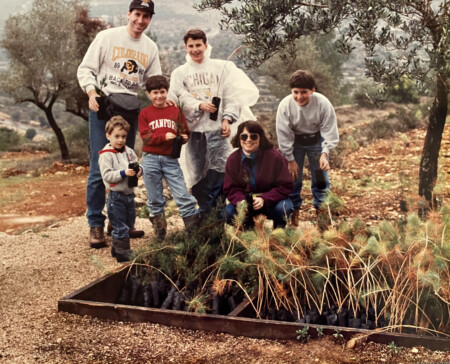
Three years of anticipatory grief did not prepare me for Ira’s death in July 2023. While my mind occasionally shifted from the present to a fast forward mode into the future, it was not possible to imagine what life would be like without the man I had married as a teenager.
When we stood under the chuppah (marriage canopy) in 1975, we were young and determined to fulfill our dreams. I finished my undergraduate education without any financial support from my parents while Ira attended and completed law school. Ira focused on building his successful legal career as I settled into the role of a loving wife and dedicated mother of our four sons.
While raising four children, I completed two graduate degrees—the first in Jewish Studies and a second in Instruction and Curriculum with an Emphasis on Diverse Language Learners. Ira’s long hours enabled our family to have an amazing life. We introduced our children to skiing, as well as the joys of traveling both near and far. Jewish traditions and lifecycle events enriched our lives. Along the way, we accumulated an abundance of photos and incredible memories.
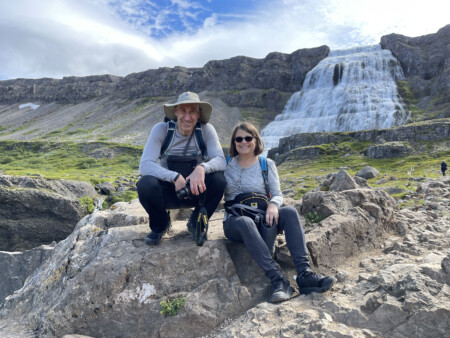
Living with Anticipatory Grief
After Ira’s traumatic brain injury in 2010, I had an inkling that our lives would never be the same. Ira shortened his work hours. We planned an abundance of vacations after his near fatal ski accident at Keystone Resort. It was impossible to predict that a decade later Ira would be diagnosed with glioblastoma, terminal brain cancer.
The stress and strain associated with a traumatic brain injury, an aortic aneurysm, and terminal brain cancer did not dampen our spirits. Our desire to embrace life continued as we fought hard to beat the anticipated survival rate of only 12-18 months. Miraculously, Ira was able to travel during Covid and ski for two and a half years before a rapid decline occurred during the final six months of his life. We both had hoped that he would reach his 70th birthday which is today. (August 19, 1954) Sadly, he fell short by about 13 months.
This unachieved milestone is like countless other hopes and dreams that will no longer be possible. Ira’s death forces me to move forward without him by my side. I need to cope with my loss as I simultaneously plan my solo path.
In the weeks leading up to his birthday, I dealt with his yahrzeit (anniversary of his death). Both milestones have caused me to pause and reflect on what I have learned during my first year without Ira.
Coping with Intense Loneliness
A loving and warm relationship has been replaced by intense loneliness. Ira was my b’shert (soulmate) for more than 48 years. I was only 18 years old when our lives became intertwined. We did everything together. When he was dying, I was on call 24/7. I held his hand at the hospice hospital until his last breath.
It’s not possible to fill the enormous gap created by his death. To help my mind and body cope with this loss, I had to eventually step outside my comfort zone. I forced myself to interact with others by traveling, skiing, and volunteering. I drove to Boulder and Denver to attend Shabbat dinners at strangers’ homes. These activities prevented me from feeling totally isolated but could not take away the intense feelings of loneliness that overshadow my days and nights.
Identifying Genuine Friendships
Disappointingly, longtime friends, acquaintances, relatives, and clergy, as well as a synagogue community could have made my journey easier but instead chose to keep their distance. Even though I know that other grieving spouses have experienced this same lack of empathy and compassion from people who could have helped, it doesn’t mitigate the sadness that comes from being marginalized.
Genuine friends support you through your grief journey. They call to see how you are doing and don’t expect you to reach out to them. These individuals listen and do not judge your past or present feelings and behavior. They make continuous efforts to include you in their lives. A few just drop by so that you are not alone.
When you are grieving it is hard to understand why people who were once part of your network of friends prefer to remain on the sidelines and fail to show up. Equally disturbing are the people who offer disparaging critiques instead of constructive comments. Sometimes it is best to keep these callous and disingenuous people outside the loop.
I can truly understand why some widows and widowers choose to hibernate in their homes. It’s hard to be around people who are unwilling to commiserate with your situation or simply do not know what to say.

Adopting Patience
I prefer a smaller circle of friends who show up. It is challenging to get along with friends or relatives who do not understand how Ira’s death permanently altered my life. I have read enough books and watched plenty of grief webinars to know that the transition from married life to widowhood takes time since my brain has been dramatically impacted by grief.
Unlike my adult children who are surrounded by their spouses and children and are kept busy with their engaging careers, I live alone with my cat Chloe and currently do not have a salaried position that connects me with coworkers. Instead, I am a part-time freelancer who communicates via email.
Everyone’s grief journey is unique and unpredictable. The process ebbs and flows and is not linear. I am trying to develop more patience with myself as well as other people. The transition from being married to being a widow does not happen overnight. It is unrealistic to think that it will be a magical process without any obstacles along the way.
Incorporating Flexibility
Flexibility goes hand in hand with patience. Some days are easier than others. Brain fog initially wreaked havoc with my organizational skills. To offset this deficit, I created “To Do” lists every night. I set a goal to accomplish a minimum of three tasks a day.
As the months passed, I expanded my expectations. While I am rarely able to check off everything on my extensive lists, I feel a sense of accomplishment when I don’t allow waves of grief to prevent me from being productive. I persevere on more challenging days but also realize that a tsunami of grief may unexpectedly knock me over. In those cases, I need to accept the reality that unless there is a hard and fast deadline, an uncompleted task can usually be finished on another day.
Focusing on the Positive
Grief filled moments are laced with negativity. To break this downward cycle, I constantly remind myself to be forward thinking. I also need to be surrounded by people who share this mindset. I prefer individuals who recognize the things that I have accomplished rather than my shortcomings. At so many points in my life, I could have fallen into despair. Instead, I preserved and overcame whatever obstacles I encountered.
While Ira is no longer by my side, I know that he would be proud that I have made the most of my first year without him. Moreover, I recognize that Ira was an amazing partner. He was kind and considerate of my feelings and did whatever he could to encourage me to succeed. Ira modeled incredible courage during his three year battle with glioblastoma. I will never forget his motto—”Keep moving and live without regrets.” I am grateful that he was a special part of my life for almost five decades.
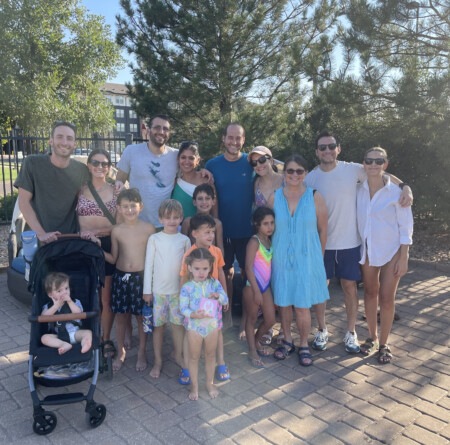
Embracing Joyful Moments
When tears washed my face throughout the day, I was unable to think of a time when I could appreciate joyful moments. The sadness was too intense and permeated everything that I tried to accomplish. I avoided large gatherings of people and festive occasions. I preferred subdued situations.
As the weeks turned into months, I became more receptive to being around others. My grandchildren became my primary source of joy. They instinctively knew how to make me smile and laugh again. Oh, how I wish all my sons and their wives would have recognized this fact. Sadly, only half understood the joy that comes from being around grandchildren.
Skiing became an elixir to my grieving process. I am grateful that I could ski thirty-five mornings during the 2023-2024 Colorado ski season. Sunshine, camaraderie on the chairlift, and intense activity were a phenomenal mix. My Rocky Mountain High helped my brain heal. I published two stories about skiing and grieving.
The Magic of Skiing While Grieving
The Benefits of Skiing While Grieving
I traveled four times during the first year. Whenever possible, I minimized flashpoints that could trigger waves of grief. I embarked on my first two European riverboat experiences which were totally different from anything that I had experienced before. My other two trips had elements that overlapped with things that I had done with Ira. When waves of grief appeared, I reached out to others for support or retreated to my room.
Each trip connected me with a fascinating array of people who made me laugh and provided additional insight into the grieving process. While it is doubtful that our paths will cross again, their kindness and consideration will never be forgotten.
To date, I have shared my travel and grieving experiences in three published stories and a fourth one is pending publication.
A Respite from Grief: A Week at Hilton Head Health
Sail the Mediterranean with Your KUHL Attire
I was interviewed for the Big Blend Radio’s Food, Wine & Travel Show that broadcasts today, Aug 19, at 5pm MST.
The interview will air on the following Big Blend Radio podcast channels, which are all distributed to all major podcast platforms such as Spotify, Apple, Amazon & Audible, iHeartRadio, ListenNotes, etc.
– Big Blend Radio: www.BigBlendRadio.com
– IFWTWA Channel – https://food-wine-travel.podbean.com/
– Vacation Station Travel Channel – https://vacation-station.podbean.com/
– Quality of Life Channel – https://quality-of-life.podbean.com/
– Women Making History Channel – https://women-making-history.podbean.com/
The video version of the interview will also be featured on:
– Our YouTube Page: https://www.youtube.com/@bigblendradio/
– Our Facebook page and groups: https://www.facebook.com/bigblendradiomags

Remembering Ira
Unlike some people who find comfort in visiting the cemetery, I would prefer to do other things to honor Ira’s memory. Last year, on his birthday I went on a hike with some of my children and grandchildren, had a family meal at a restaurant, and planted a few things in my backyard. A month later, I participated, along with some of my children, in the National Brain Tumor Society walk at Denver’s Sloan Lake.
Throughout the first year, I recited the Mourner’s Kaddish ( an Aramaic prayer recited in memory of close deceased relatives) whenever it was possible. When I observed this Jewish ritual after my father passed away in 1993, congregants at Congregation Beth Shalom in Northbrook, Illinois made me feel welcome. They understood and practiced the Jewish value of Chesed, acts of loving kindness. Much to my dismay, I found the opposite situation in Colorado. Minimal efforts were made to foster a caring environment.
In July, I designed a 100+ page photo album memorializing Ira’s life. Since our grandchildren were very young when he passed away, I wanted to create a collection of 800+ photos that offered an overview of Ira’s remarkable life.
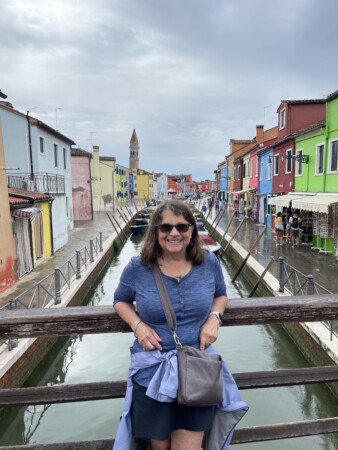
Transitioning from Being a Couple to being Single
Ira’s death caused me to alter my thinking from “we” to “I.” I no longer had another opinion to consider. Everything became an executive decision. I also became completely responsible for Ira’s share of household responsibilities. For the last six months of his life, I took over these skills as his capabilities diminished. I embraced these additional tasks while my brain was trying to come to grips with the immense loss of Ira’s presence.
I took little steps each day to figure out what had to be done. My confidence increased as I made more and more decisions. My mind constantly replayed Ira’s response to my question, “How am I going to survive without you?” He repeatedly stated, “You’re smart, you’ll figure it out.”
Sleepless nights became the norm. To combat the ill effects of sleep deprivation, I maintained a healthy diet, spent time outside, exercised, indulged in a once-a-month massage, and made meditation an evening habit. Afternoon naps kept me going.
After years of being Ira’s care partner, I shifted my focus. The combination of being a grieving widow and being a former care partner are not a healthy mix. To remain balanced, I focused on myself. Traveling and skiing are temporary ways to improve my quality of life. I had to figure out what I could do 24/7 to make my life better.
Starting the Next Chapter
In the coming year, I will begin the next chapter in my life. By relocating to a 55+ community, I will be expanding my social networks, establishing new roots, and identifying ways that I can reestablish meaningful purpose in my life. I will have additional opportunities to connect with empty nester neighbors and will no longer need to drive long distances to take classes, volunteer, and meet people for meals. Since I will be residing in another area, I look forward to joining a welcoming Jewish community.
Even though I have not dated in fifty years, I am open to the idea of meeting single men. It is hard to imagine how that process may evolve since Ira will always remain in my heart as my b’shert.
Waves of grief will remain, but will hopefully become less intense and more infrequent… My improved quality of life will positively address my pervasive loneliness. I will continue to share my journey. Perhaps, my words and actions will encourage other grief stricken widows and widowers to identify their next chapter in life.
BIO
Sandy is an award-winning author and lifestyle/travel journalist. She is the author of 100 Things to Do in Boulder Before You Die, a guidebook offering an easy way to pinpoint your best options in a sunny, high altitude college town. Sandy’s second book, May This Be the Best Year of Your Life highlights her living and teaching adventure in Bangalore, India. As a licensed Colorado teacher, she taught K-12 students in the United States and abroad. Sandy also taught college-level courses at Front Range Community College and the University of Colorado-Boulder.
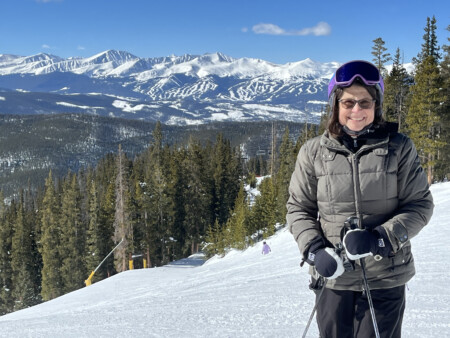
Connect with Sandra